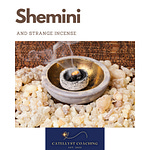This week we are studying Parashat Vayikra (Leviticus 1:1-5:26). We left off a year ago with the closing of the book of Exodus (Shemot) and the story of how one family went into exile as a tribe and came out of exile as a Nation. Leviticus is the third book of the Torah and lists many of the foundational teachings about justice and living in peace with G-d and our neighbors. Since the Tabernacle has just been constructed, it begins by teaching us about animal sacrifices. Our sages teach that each of the animal sacrifices is a template for prayer that we can continue to use to connect with G-d today.
Vayikra Aliyot Summary
The first sacrifice mentioned is an OLAH offering, which is an offering of gratitude.
A fowl can be offered as an OLAH, in addition to the cattle, sheep, or goats from the first aliyah. This aliyah also teaches us about the additives required when bringing a voluntary meal offering.
The OMER- a mandatory barley offering that marks time between Pesach and Shavuot in the Spring- is described. We are also commanded to NOT bring leavened sacrifices (with two exceptions), and to salt everything.
The Shelamim, or PEACE offering is described in this aliyah. Since these offerings are eaten, the Torah uses this point to teach us about forbidden parts of the animal: the forbidden fats, and the blood.
Finally we learn of the “SIN” offering (Chatat), and a process of teshuva (repentance). This offering is only for people who commit unintentional sins. In this episode we discuss the different approaches for someone who sins intentionally vs unintentionally.
The final type of “Sin Offering” is actually a teaching on social justice, and requires a less expensive Chatat for those who make less money, and more expensive Chatat for the wealthy. This aliyah also teaches a process of confession and approach to clear guilt in a situation when we aren’t sure if we sinned or not.
The ASHAM offering is described in the seventh aliyah. This offering was to atone for misappropriation of Temple property. Interestingly, the same offering is used for someone who falsely swears regarding money owed to another person. So we see that business dealings - or more broadly, how we treat others - is at the focal point of our relationship with G-d.
Parenting Touchpoint:
There is no prescribed offering or atonement for intentional sin. In the case of habitual sin, or repetitive sin, that is intentional, a system of teshuva (repentance) must be taught.
Gratitude is something that we cannot FORCE upon our children, but is something that we are responsible for cultivating in our children. There is a fine line between demanding thanksgiving, and encouraging it.
May the G-d of Abraham, Isaac and Jacob bless you with rest and a heart that can trust in this "load" season. The best is yet to come. Until next time, Shalom!
This work is provided by the generous support of listeners. If you are enjoying this podcast, please help us out by sharing it with another parent.
If wish to support this podcast financially, you can do that here:













Share this post